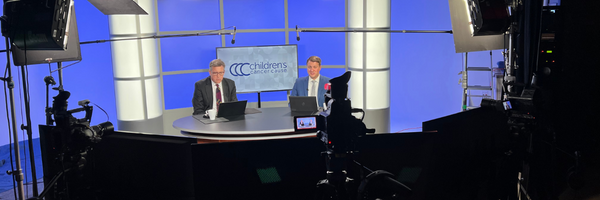FDA-Approved Meeting Gives A Voice to Childhood Cancer Families Impacted by Cardiac Late Effects
Children’s Cancer Cause is accepting comments from childhood cancer families and survivors impacted by cardiotoxicity until October 17, 2022.
Pediatric cancer survivors and caregivers spoke to the Food and Drug Administration (FDA) earlier this month about the “ticking time bomb” of cardiac late effects caused by harsh chemotherapy and radiation treatments. During this Externally-led Patient Focused Drug Development (EL-PFDD) meeting, hosted by Children’s Cancer Cause, survivors and families shared their experiences with treatment-induced cardiac late effects that may lead to a lifetime of health challenges, describing symptoms ranging from heart failure to high blood pressure, chronic fatigue, and more.
In this blog post, we highlight some of the personal stories shared during the September 15th virtual meeting, Reducing Cardiac Late Effects in Childhood Cancer Survivors, which gave childhood cancer survivors, parents, and caregivers an opportunity to present to a wide range of stakeholders, including staff at the FDA and the National Cancer Institute (NCI), pediatric oncologists and other healthcare providers, and representatives from pharmaceutical companies.
Survivors and caregivers expressed significant anxieties about the possibility of heart surgery, heart transplants, or having a heart attack as top concerns:
Anthracyclines and radiation therapy are the backbone of treatment for a significant percentage of pediatric cancer patients, but they can lead to serious, chronic, and sometimes life-threatening cardiovascular complications that can increase with age and impact long-term well-being. Childhood cancer survivors are at a 15-fold increased risk of developing congestive heart failure (CHF) and are at a seven-fold higher risk of premature death due to cardiac causes, when compared with the general population.
A survivor of Hodgkin’s lymphoma testified during the meeting about her experience receiving a full open-heart bypass at age 32 as a consequence of cardiac damage resulting from her childhood radiation and chemotherapy treatments. Another survivor also testified about open-heart surgery in his 30s, which was followed by a stroke. He now takes 21 pills every day to manage diabetes and prevent heart failure.
Survivors spoke about challenges with everyday activities due to shortness of breath, racing heartbeat, fatigue, and depression and anxiety.
One survivor who is 20 years old and was treated for neuroblastoma at age five, discussed the life-altering impacts of requiring portable oxygen and a wheelchair as a young adult:
In total, over 150 people participated in the event livestream, which featured patient and family testimonials, panel discussions, research presentations, and interactive polling.
The meeting also included testimony from parents whose children survived their cancer but later died from cardiac complications caused by the harsh, toxic treatments:
As a follow-up outcome from the meeting, Children’s Cancer Cause will submit a Voice of the Patient report to the FDA in January 2023. Children’s Cancer Cause is accepting comments from families and other stakeholders about treatment-induced cardiac effects until October 17, 2022, to be considered for inclusion in the final report.
A recording of the meeting and the comment form is available at childhoodcancerpfdd.org/livestream.
Children’s Cancer Cause thanks the FDA for approving this meeting topic and all the participants who made it a success. This meeting was presented in collaboration with the American Academy of Pediatrics, the American Society of Clinical Oncology (ASCO), the American Society of Pediatric Hematology/Oncology (ASPHO), The Andrew McDonough B+ Foundation, and Teen Cancer America.
Children’s Cancer Cause also acknowledges Day One Biopharmaceuticals, Whole Foods Market, Community Health Charities (CHC), and the Stewart Initiative for Childhood Cancer Survivors, for their sponsorship to help make this meeting possible.
ASCO® and American Society of Clinical Oncology® are registered trademarks of the American Society of Clinical Oncology, Inc. Used with permission.

